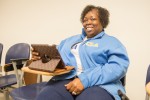Her 10-year-old grandson prays every night that someday, he will be able to attend UCLA. His inspiration is his 54-year-old grandmother, Hazel Reed.
Reed, a third-year Afro-American studies student, decided she would continue her education at the age of 50, after a year of bed rest. The constant pain and limited mobility that ensued from spinal and joint problems were secondary to her goal of becoming a lawyer.
“I want to help first-time offenders, young mothers and the marginalized community at large,” Reed said. “The law degree in itself will give me another tool to help them (with) the legal challenges that they may face.”
Despite her passion for education, Reed said studying is not easy. She said the farthest she can walk is from Charles E. Young Research Library to Campbell Hall because of several medical conditions.
The 15 medications she takes for back problems, such as degenerative disc disease, also affect her short-term memory and cognitive skills to some degree, Reed said.
“I know that it might take me two or three times longer (to learn) than someone who is younger and someone who is not taking the medication that I’m taking,” she said.
She said she takes less medication even if she has to cope with more pain, so the drugs don’t interfere with her studies.
Reed enrolled in Long Beach City College at 17, after graduating from high school. A year later, she became a single parent.
She said working part time while attending classes was not enough to give her daughter, Rashida Harrison, the life she deserved, so Reed withdrew from her classes and decided to work full time.
To provide Harrison — whose childhood dream was to become an actress — with a private school education and acting classes, Reed strived for higher positions at work, her daughter said.
Reed started off working full time at a telephone company, answering phone calls at customer service. Later, she was promoted to a quality assurance manager and trained other customer service employees.
Harrison said her mother considered her daughter’s academic performance as the utmost priority. The day she got two B’s in sixth grade was the last day she received a B, Harrison said.
“My mom told me, ‘You have the brains. There is no reason for you not to do well,’” she said.
Almost 40 years after graduating from high school, Reed decided to continue her education in pursuit of a joint J.D. and M.A. degree – a tool she said is crucial to establishing a resource center that helps members of marginalized communities.
After taking a combination of online and hybrid classes from Riverside Community College District, she received two associate degrees in 2012. The same summer, she transferred to UCLA with a full scholarship.
Reed said her decision to study law and interest in pro bono legal representation partially come from her witnessing minorities’ limited access to legal representation.
About 12 years ago, someone she was close to was sentenced to 45 years of imprisonment after shooting someone during a fight. He was 17 when he was sentenced.
“The judge said he was a menace to society and gave him 45 years,” she said. “He is (in jail) right now because there was no (legal) representation.”
Although she is not justifying his act, the gravity of the punishment was unfit for the crime, Reed said. Given that he had not killed anybody and was only a 17-year-old with no prior criminal records, 45 years in adult prison was too harsh, she added.
She said she thinks undergraduate education in African-American and Chicano studies has provided her with the background knowledge of the legal difficulties that minorities face.
“The system is not really set up for most of marginalized community to succeed – educationally and occupationally,” Reed said. “For me to make the best difference, I have to be educated especially on this level.”
Reed’s high regard for education is something she has passed on to her husband, Luis Reed.
“She’s real sneaky. She made me carry her books to class (at community college),” said Reed, who studies business at West Los Angeles College.
Reed enrolled in the community college after learning he could not renew his license as a Class A truck driver because of health problems.
“My wife is my hero. I’m not a scholar like she is, but I decided that I could at least accomplish something,” he said.
Hazel Reed’s professor, Robert Romero, said despite her physical challenges, Reed is a hard-working, attentive student.
“It’s obvious she cares about being a good student,” he said. “She works hard at understanding the material.”
Reed said she does not intend to let her physical challenge stand in the way of her goal.
“I finally feel like I am at an arena where I belonged all along,” Reed said.

That is so inspiration. Good for Hazel!
I am so proud and so inspired by my Sister-In-Law. She is a great example of perseverance and faith. I am sure that she will accomplish all that she has set her mind to do.